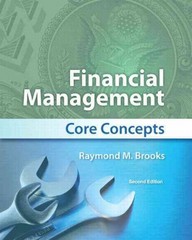QUESTION 1 The doctrine of stare decisis: makes the legal process more expensive is an equitable remedy makes the law more predictable is unimportant to the common law QUESTION 2 Jen filed a lawsuit against Ross for failure to repay $1,000 according to the terms of a promissory note. The trial ended before it began, with the trial judge granting a motion for summary judgment in favor of Jen. Ross has appealed, and the Supreme Court of lowa has remanded the case. This means: Jen automatically wins because she won in the lower court Ross automatically wins because he lost in the lower court. Neither party wins because the case is being thrown out We don't know who wins yet because the case is being returned to the trial court for additional steps QUESTION 3 when evaluating the right decision. Deontological ethics bases it value on Results of doing something Happiness in doing something Reason for doing something The rules QUESTION 4 John discovered his company's accountant was "skimming money from the business. The accountant agreed to pay John a one-time payment of $25,000 not to report the skimming to company officials. The accountant promised she would pay the money back when she could. John accepted the money and never reported what he knew. A year later the accountant was fired when the accountant's actions were discovered, she was also prosecuted for theft. The payment to John was never discovered. Which statement is correct? John's act was unethical and illegal lohn's act was unethical but not necessarily illegal John's act was ethical since he believed the accountant would return the money, however, it was illegal Based on the facts, lohn's conduct was both ethical and legal given the special circumstances of this case QUESTION 5 When an appeal is filed with the U.S. Supreme Court, the Supreme Court O must hear the case if the validity of a federal statute is in question. must hear the case if two or more U.S. courts of appeals have decided the legal issue differently has discretion as to which cases it hears must hear all cases QUESTION 6 In a civil case, the plaintiff must prove the case by a preponderance of the evidence beyond a reasonable doubt None of the above; the burden of proof is on the defendant by the 80% more likely than not rule









